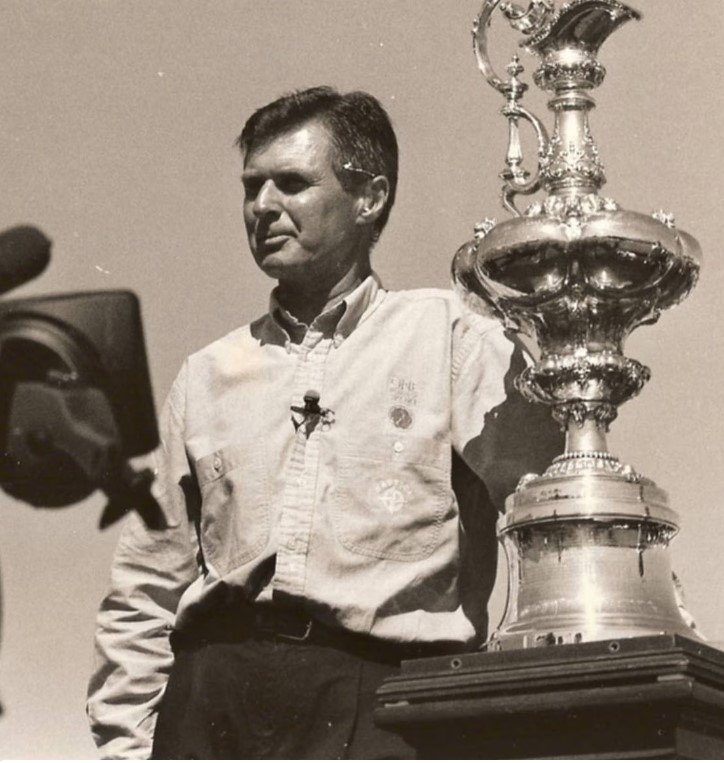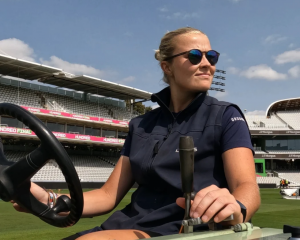
He’s often asked what his number one highlight is.
“It’s hard to pull out one but Danyon Loader is always right up there.”
Loader won gold medals in the 200m and 400m freestyle at the Olympic Games in Atlanta, Georgia in the US in 1996.
“I remember the tingling sensation when I looked across to the support crew and the other New Zealanders on the other side of the pool when he won.
“I was working with Anthony Mosse and the two of us hugged, and we had other broadcasters coming up shaking our hands because they realised the significance of a New Zealander winning an Olympic gold medal in the pool.
“I still get a buzz thinking about that.”
McBeth’s memories of Loader’s success are part of his book It’s Over! – A Broadcaster’s Story.
On radio and television, McBeth has covered All Blacks test matches, Rugby World Cup tournaments Olympic Games both summer and winter, Commonwealth Games, and lots more.
His book chronicles his early life in Timaru, how his career started, major highlights, and various interesting and at times humourous anecdotes.
The idea of writing about his life started not long after his son Paul started jotting some notes about his life, which prompted McBeth to take over and write about his life but only for family purposes.
However, when colleague and friend Joseph Romanos suggested McBeth had plenty of interesting stuff to write about, the book idea became a reality.
Spurred on by family and friends, McBeth, from Raumati Beach, started the book-writing process.
Writing the book was challenging, but with diary entries prompting memories, it started to evolve.
“I wrote a bit, then put it aside, would go back to it, and then thought ‘this is crazy, it’s taking far too long’.
“So late last year I made a concerted effort and just went for it.
“I spent hours out in my office just going through stuff.
“Reading through my diaries, I didn’t realise how much I’d done over nearly 50 years, and during a great period of New Zealand sport too.”
McBeth, who was born in Kurow, started his career at the Timaru-based radio station 3ZC where he was part of a team who selected songs to play.
One Saturday afternoon, while at a loose end because he had been injured playing for the rugby club Celtic, he listened to the radio and wondered how his team was getting on.
“I approached my boss and said, ‘How about I come into the station and ring around the grounds for rugby results?’
“And then it expanded into other sports.”
He transferred to Dunedin where he joined the 4ZB team covering sports at the weekends, before joining Radio New Zealand and sports broadcasting, since 1975, became his life.
He credits a lot of his progress to being in the right place at the right time.
“You take a chance and say yes when at the back of your mind you’re not too sure.”
The book also highlights behind-the-scenes anecdotes such as being a lone radio reporter in a foreign country and setting up to commentate on a game.
“A couple of times I mention running up the steps of a grandstand when the haka was being performed by the All Blacks, and I was carrying a borrowed phone because the local telecommunications hadn’t sorted my gear.”
He recalled another situation when he had to think fast on his feet.
McBeth was an announcer at the World Bowls Championship, in Christchurch, when there was a gold medal ceremony for Val Smith.
“Val stood there with eyes closed, clutching a stuffed kiwi, waiting for a gold medal, but the national anthem recording wouldn’t play so I picked up a microphone and sang it.
“Everyone joined in which was great.”
Another memorable sporting moment was the “thrilling” first Rugby World Cup in 1987.
“At that stage, no one knew how successful the World Cup would be.
“It happened after the Australians and New Zealanders almost pushed and dragged the IRB with them because there was a lot of opposition to a rugby world cup being held, even thought about.
“When it was held, and they saw how successful it was, here and in Australia, everyone was suddenly onboard and it was a huge success.”
McBeth also describes his “rough” transition from radio to television in 1993 as the most difficult part of his working life.
“I always had the feeling they were going to chop me.
“I had been successful in doing radio on rugby and other stuff.
“TVNZ asked me to host a programme called Boots’n’All which was really successful, and controversial, with the likes of Andy Haden firing shots at Alex Wyllie who was the [All Blacks] coach.
“From there came the approach to join TVNZ full time and it was really for me to slot in ahead of Keith Quinn who was number one with Grant Nisbett.
“The difficult part was that I was quite naive and didn’t realise what was going on.
“These decisions weren’t being made by the sports section but higher up.
“So I came in and got no support and was told to just ‘do it as you see it mate’.
“It was an uncomfortable time, and almost set up to be a battle between Keith, Grant and I, to see who was going to be the top commentator.
“But the great thing is, as Keith said recently, we’ve remained good mates.”
By 1995, McBeth was on America’s Cup duty “by default” as other personnel couldn’t attend.
“I went back to New Zealand and there had been a change of hierarchy in TVNZ and they asked me to do the fronting for rugby which became my forte.
“Things went smoothly, so I went along until TVNZ lost all their (rugby) rights.
“And then it was working, as an individual, for the Olympic Broadcasting Service.

“In Valencia, I was onboard (18th man) the Team New Zealand boat when they sailed a race.
“It was an extraordinary experience.
McBeth also has a claim to fame as he co-coached a team in the first official women’s rugby match in New Zealand, in 1980.
“When I was in Hawke’s Bay, a Manawatu radio announcer was looking at getting a women’s team together.
“He called me to get a women’s team together, come to Palmerston, and play it as a curtain raiser to the Hawke’s Bay v Manawatu.

“I thought ‘hell’ and called in a rugby coach to help.
“We had a runaround, a trial match, picked a team and then played and lost to Manawatu.
“Never thought any more about it.
“But about 10 years ago Farah Palmer rang me and said a lot of research had been done on women’s rugby and it had been determined the match was the first official women’s representative rugby match in New Zealand.
“There’s a cup which is presented yearly to the winner of the match between Hawke’s Bay and Manawatu, that has mine, and the Corbett's name, on it.”
McBeth was “chuffed” with the finished self-published book.
By David Haxton













